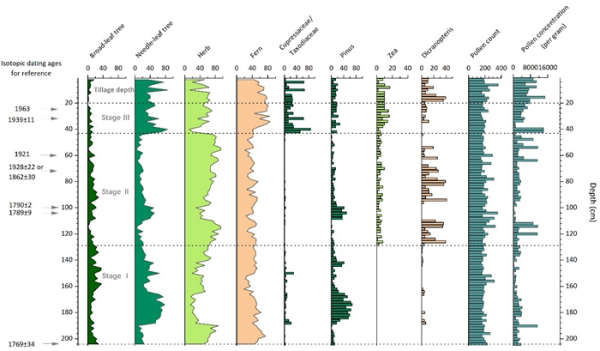Wang Kelin, a researcher at Huanjiang Karst Ecosystem Observation and Research Station of the Institute of Subtropical Agricultural Ecology, Chinese Academy of Sciences, has made progress in historical human disturbance and forest evolution in karst areas in southwest China. Recently, relevant research results have been published in Earth's Future under the title Maize Cultivation Three Hungered Years Ago Triggered Seven Rocky Description in Southwest China.
Exploring the historical changes in regional vegetation and the history of rocky desertification is the key to answering the current and future sustainability and potential of afforestation in karst areas. However, previous research on the historical period of rocky desertification and human activities in karst areas mainly relied on historical literature records, lacking scientific evidence.
The Wang Kelin team, relying on the Huanjiang Karst Ecosystem Observation and Research Station, has conducted preliminary research on the impact of human activities and forest evolution in karst areas during historical periods. The team has established a historical human disturbance identification method based on karst depression sediment dating, which uses 137Cs and 210Pbex dating at a hundred year scale, and historical dating is mainly based on carbon debris 14C. This study conducted palynological analysis on sediments in typical karst depressions, and combined historical literature and local surveys to reconstruct the three stages of "afforestation deforestation sporadic afforestation" in karst areas over the past 300 years. Before 1780, the pollen concentration of coniferous and broad-leaved trees was relatively high, indicating that the current rocky desertification area may have been covered with dense coniferous and broad-leaved mixed forests during historical periods; After 1780, the simultaneous appearance of corn pollen and pioneer species Osmunda spores marked a significant change in the ecological environment; Since the 1930s, there has been sporadic afforestation in the region, characterized by a sudden increase in the number of coniferous/cypress pollen. Research has shown that the introduction of corn, population growth, and immigration have accelerated mountain cultivation and deforestation, leading to the occurrence of rocky desertification in historical periods. This is an important reason why some karst areas are currently difficult to naturally recover into forest landscapes.
The above achievements provide scientific basis for determining the baseline of ecological restoration in karst areas and accurately returning forests and grasslands. The research work has received support from the National Key R&D Program and the National Natural Science Foundation of China.
Paper link:
论文链接

Spore pollen analysis and reference dating data in karst depressions




